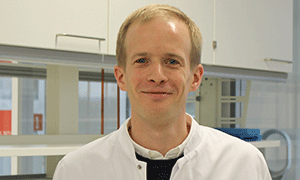
Group Macrophage function in cardiac repair and regeneration
Thus, cardiac repair processes following myocardial infarction lead to the formation of a non-contractile fibrous scar, hence compromising cardiac function. Increased stress on the remaining viable myocardium ultimately leads to expansion of the scar and pathological remodeling of the heart, finally resulting in the development of heart failure. In stark contrast to the adult heart, the neonatal mammalian heart has a much higher capacity to fully regenerate following cardiac injury. In both contexts, the local inflammatory response that develops in the injured heart is a critical regulator of cardiac repair and regenerative processes. In particular, macrophages, a specific cell type belonging to the innate immune system, play a role herein and can have both beneficial (promotion of cardiomyocyte survival and proliferation, promotion of neovascularization to restore blood supply) and deleterious (induction of cardiomyocyte death, promotion of fibrosis and excessive proteolysis) functions.
The objective of our research is to understand the mechanisms controlling the balance between beneficial and deleterious functions of macrophages in the injured heart. To this end, we will employ murine models of myocardial infarction and neonatal heart regeneration, combined with cutting-edge technology that allows a high-resolution analysis of the macrophage phenotype at the single-cell level. We aim to uncover the intrinsic molecular mechanisms regulating macrophage function in the injured heart, but also how interactions with other cells shape macrophage behavior. Newly discovered mechanisms will then be targeted in pre-clinical studies to test skewing macrophages towards protective and pro-regenerative actions, while preventing their deleterious functions. In the long term, our findings may lead to the development of novel therapeutic strategies targeting macrophages to improve the cardiac repair process in patients with myocardial infarction.
Biography
Clément Cochain completed his PhD in 2011 in the Paris Cardiovascular Research Center (France), where his research focused on the role of the inflammatory response in neovascularization and tissue repair processes in myocardial infarction. From 2012 to 2017, he worked as a postdoctoral researcher in the Institute for Experimental Biomedicine (Universitätsklinikum Würzburg) under the supervision of Prof. Alma Zernecke-Madsen, where his investigations focused on the inflammatory pathogenesis of atherosclerosis, the main underlying cause of myocardial infarction. Since 2018 he leads the Junior Research Group Macrophage function in cardiac repair and regeneration.


